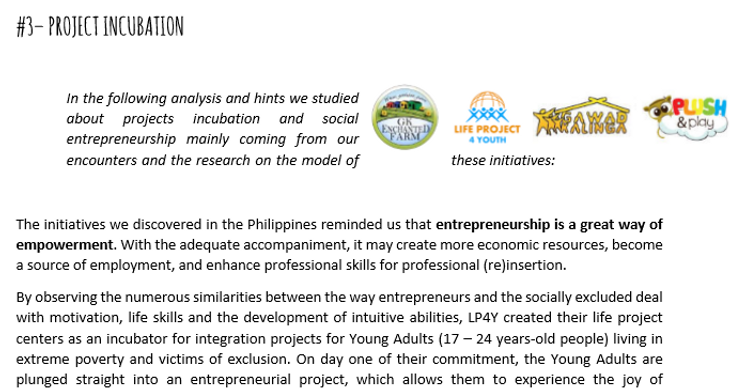
#1 PHILIPPINES
France-Philippines United Action
France-Philippines United Action is a foundation of the French Chamber of commerce in the Philippines, born on the initiative of the former French ambassador - Gilles Garachon - after typhoon Haiyan in 2013. Its aim was to be a coordination platform between French companies ressources and local NGOs projects for reconstruction and ressettlement.
Click here for more information.
Contact : Clémentine Turgeaon, executive director
Forced Displacements in the Philippines


Natural Disasters

Conflicts
Some interviews
A general Overview
Habitat For Humanity
Habitat for Humanity is an american NGO which settled in the Philippines in 1998. It partners with low-income families to build, repair or upgrade their homes through a regular or a specific disaster response program. In the regular program, families progressively reimburse their properties, in the second, whole communities are created.
Click here for more information.
Contact : Gail Padayhan, Operation Assistant (Visayas Program)
Life Project for Youth
Life Project for Youth was created in 2009 in the Philippines as a solution for social and professional reinsertion for excluded youth between 17 and 24 years old. Through many training center, coaching and project incubation, the youngster learn necessary skills for a better future.
Click here for more information.
Contact : Amicie Campion & Charles Dulière, Coach
 |  |  |  |  |
|---|
Discover more and deeper...

Rural Exodus

Plush & Play
Plush & Play was born through Gawad Kalinga, a Filipino NGO, in 2012. It aims at rebuilding a Filipino toy industry by employing rural women to create fruit plushs embodying the national identity. It was the first Filipino society to be sold at Toy Kingdom.
Click here for more information.
Contact : Fabien Courteille, Founder & CEO
(Interested ? Feel free to ask any question by contacting us)
Key Learnings





Some easy facts we need to remember:
Most of the refugees can be considered as impoverished in their hosting country or region. Although it is well known that poverty doesn’t migrate, and mostly only the richest can afford to leave their country to reach European Lands to flee a dangerous situation. Other remain in their homeland or in neighbor countries - and the current situation of Lebanon hosting the equivalent of 25% of its own population fleeing Syrian conflict is a good example to illustrate that fact. Forced displacements are sudden events, migrants are not prepared to move and settle in their new “Home” – if they find one.
Nobody was born refugee but become Refugee. Refugee is a statute, according the Convention of Geneva of 1951, which is given under specific conditions only. All refugees recently coming to France or Europe form a very heterogeneous group. They cannot be considered as one single group that we would call “Refugees”. If may seem trivial to remind it but still, they come from different locations, have different languages and customs, different religions, and it remains true even within one single country of immigration. They differ from their hosting region by their religion and their culture. The refugee policies should – above the economic aspects of integration - understand how to build and design a bridge to come over this religious and cultural gap.
French vs. Filipino situation:
The French and Filipino situation are even though comparable, still different in many ways. Poor and displaced people here in the Philippines are a majority. Migrants here are often internally displaced people, and thus have legal documents for the clear majority and given the current state of corruption and strong religious influence, other ways are possible to get some – baptism certificate could for instance sometime be used as a birth certificate to prove one’s identity-. In fact, only about 20 refugees – who have been recognized as such through the Geneva convention and are helped by the UNHCR - arrive in the Philippines each year. The causes of internal migration indicated above are mainly due to natural disasters, rural exodus, and terrorism threats in the southern islands. Hence the administrative officialdom of asylum seeking does not apply here. Moreover, it remains obvious that the level of development of the country – and the strong presence of agriculture in the Philippines – makes that the employment market as well as social services are different from France.
Filipinos are not familiar with revolution as strongly as the French past but is dominated by a strong belief in Catholicism. Christian values still have a strong clout in the behavior of common people, and have also an impact on the claim and implementation of social change. Cultural habits and ways of thinking are very different between the two countries, but even though we strongly believe than some similarities can be found in those two situations: in one side, refugees afflux currently mainly from Middle East and Africa and in the other side, internal displaced people who need to relocate after natural disasters, conflict or to flee rural poverty.







